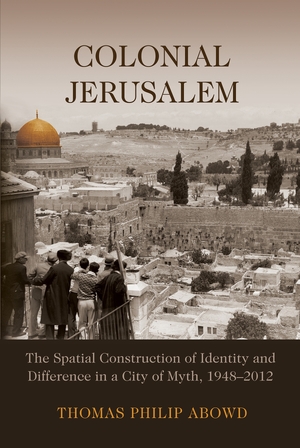"Abowd’s anthropological approach brings both color and great attention to the symbolic and human dimensions of the tensions in daily life. His apt analysis of signage in public spaces and the salience and physical condition of sites and objects he studies are matched by astute observations regarding the tone of voice, body language, and silences of his interviewees."—Journal of Palestine Studies
"A rich and engaging ethnographic exploration of Jerusalem, its world of separation, of the homes, lives, memories, and histories of the Palestinian Arabs that have been shattered and the anguish and anger it has created and fomented for 68 years."—American Anthropologist
"A welcome contribution to a growing trend of writings about urbanism and the life in cities of the Middle East. Although more than half of the population in the Middle East is currently living in urban areas, anthropological writings continue to focus on small-scale societies and tribal communities. Colonial Jerusalem helps to align anthropology scholarship with actual demographic conditions."—Aseel Sawalha, Department of Anthropology, Fordham University
"Elegantly and captivatingly written, this ethnographic study of Jerusalem as a site of colonial rule offers a substantial contribution to studies of colonialism, particularly in its modern, urban manifestation and over a long period of time."—Julie Peteet, Department of Anthropology, University of Louisville
Description
In one of the few anthropological works focusing on a contemporary Middle Eastern city, Colonial Jerusalem explores a vibrant urban center at the core of the decades-long Palestinian-Israeli conflict. This book shows how colonialism, far from being simply a fixture of the past as is often
suggested, remains a crucial component of Palestinian and Israeli realities today. Abowd deftly illuminates everyday life under Israel’s long military occupation as it is defined by processes and conditions of “apartness” and separation as Palestinians are increasingly regulated and controlled.
Abowd examines how both national communities are progressively divided by walls, checkpoints, and separate road networks in one of the most segregated cities in the world. Drawing upon recent theories on racial politics, colonialism, and urban spatial dynamics, Colonial Jerusalem analyzes
the politics of myth, history, and memory across an urban landscape integral to the national cosmologies of both Palestinians and Israelis and meaningful to all communities.
About the Author
Thomas Philip Abowd is a lecturer in the Department of German, Russian, and Asian Languages and Literatures at Tufts University.
Series: Contemporary Issues in the Middle East
6 x 9, 312 pages, 16 black and white illustrations, 5 maps
August 2016

